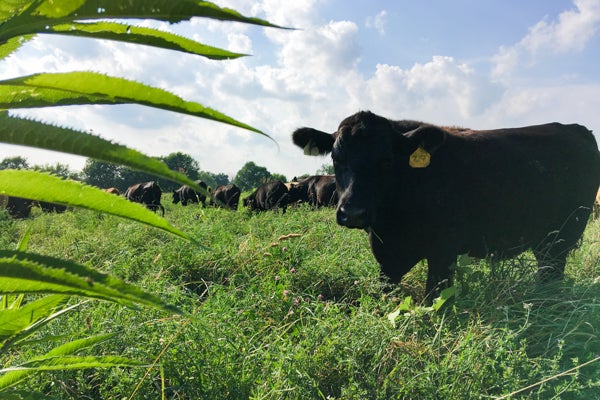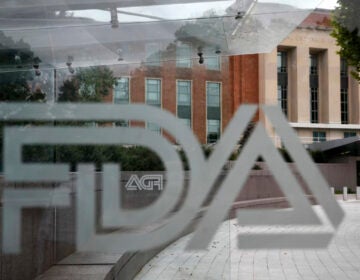As Americans quit smoking, farmers give up tobacco
Listen 9:18
Tobacco plots at the University of Kentucky. Researchers are growing Burley plants, the most common tobacco variety in the United States. (Morgane Fouse of Prismatic Radio LLC./for WHYY)
Shifting public opinion and smoking habits have changed Kentucky farming.
I’m in northern Kentucky with University of Kentucky tobacco researcher Robert Pierce, who goes by Bob. He took me to see the crop that has dominated this region for decades. He says if you’re looking at tobacco grown in the United States, usually it’s a variety called Burley. The plant has creamy green pale leaves, and the university plot we visited has waist-high plants neatly aligned in rows.
I’m here to learn about the crop, but also about a Depression-era federal initiative called the Burley Tobacco Program.
“The purpose of the program was to control the supply of tobacco so that prices would be stable for the growers and the growers would know what kind of price they would have going into the season,” Pierce says.
It limited how many acres a farmer could grow, which kept operations fairly small.
“The average at that time was three to four acres per farm of tobacco,” he says.
The program created a sort of minimum wage for farming, but instead of hourly, it was done by one year or one growing season. It wasn’t a subsidy, like with corn or soy, but instead it was a price support designed to operate at essentially no cost to taxpayers.
Still, eventually, it lost popularity.
“Tobacco has health problems with it, I’m sure you’ve heard that. It’s not considered good for people to smoke,” says Mary Berry, a big advocate for farming culture here in Kentucky.
She’s executive director of the non-profit The Berry Center, which works for sustainable agriculture.
“Not considered good,” is quite an understatement. We’ve all known for a long time that smoking is bad for us, and it’s still killing lots of people. In fact, it’s the single biggest preventable cause of death in the U.S.
Public opinion about smoking and changed health habits have changed the life of farmers in Kentucky.
“In the 80s we knew tobacco was threatened and was probably not going to survive, we started the work of trying to get on the other side. To help farmers … survive the change,” Berry said.
She and her center are trying to bring back a little of what Berry feels has been lost. For more than 60 years, the federal program propped up the tobacco industry. During that time, farmers were only allowed to grow so much tobacco, so they diversified — raising cattle and different crops to feed themselves and their communities. Beef prices might fluctuate, vegetables can be labor intensive, but with the support of the federal program, farmers were able to count on tobacco income.
“It was an economic backstop that kept farmers healthy, stable,” Berry says.
As our culture became more and more aware of the dangers of smoking, tobacco farming got caught in the crossfire, says Berry Center archivist Michele Guthrie.
“There were all these essays in the newspapers that considered whether farmers were at fault for having a livelihood,” Guthrie says.
She says societal pressure mounted.
“The federal government was on the one hand supporting tobacco, on the other hand discouraging its use in terms of health. So that was a conundrum the federal government eventually, I guess, could not handle,” Guthrie says.
By 2004 the Burley Tobacco program was brought to a close, and in the aftermath, Kentucky lost about 25,000 small farms.
“The Kentucky Ag census said there was something like 30,000 tobacco farms in the state, and now we’re at about 4,500,” Bob Pierce says.
The farmers who survived? They’ve largely become huge industrial operations.
“So instead of two or three acres of tobacco, now we have two to three hundred acres of tobacco. So much larger growers but fewer of them,” Pierce says.
After speaking with Bob, I wanted to find a farmer who stuck around after the end of the Burley program.
Robert Reed Bush Sr. has a farm in Henry County, Kentucky, where he invited me into his home to meet his wife, Marlen — and of course, to have a glass of lemonade.
Bush Sr. and his family have been growing tobacco a long time.
“I started raising tobacco in 1948 in 4H club and haven’t missed a year since. Tobacco used to be a family thing. That’s what paid for everything. It paid for going to school, it paid for most everything on the farm,” Bush says.
The Bush family now grows about 100 acres of tobacco and uses migrant labor to make that work.
“You either had to get bigger or get out, that’s just about what it amounted to,” Bush says.
Farmers here now have to keep up in the free market competing with tobacco growers all over the world. Tobacco sales outside the U.S. are still very strong but Bush says farmers could be doing better.
“We haven’t had a raise in 15 years or longer. That hurts the economy of the farmers and the state of kentucky,” Bush says.
That’s why people at the Berry Center say that reviving Kentucky’s small farming economy is so essential.”We’re not gonna have that again, if we rely totally on industrial agriculture, which is ruinous and brain-dead and destroying the land and the people that belong to the land,” Berry says.
“We’re not going to be able to fix this with big solutions. We’re going to have to fix it on the ground, where we are. We’re gonna have to save ourselves. My husband says, ‘The cavalry ain’t comin.'”

Clark Family Farms near Lexington, Kentucky, raises free-range beef cattle. In the heart of tobacco country, farmer Todd Clark has diversified production to include chickens, vegetables and hay.Photographer: Randy Scott Carroll of Prismatic Radio LLC. (Morgane Fouse of Prismatic Radio LLC./for WHYY)
Before I left Kentucky, Mary Berry sent me to see Todd Clark, who she says is doing the kind of farming that the Berry Center hopes to support.
Clark still grows some tobacco, but instead of scaling up — getting big, he’s chosen to raise a wide variety of food including chickens, vegetables and hay.
“I want to produce stuff that there’s not many questions about its wholesomeness or cleanliness or greenness or whatever, that you can kind of be proud to stand behind it and say this is something I produced, verses one of the components in a Marlboro,” Clark says.
He’s raising beef cattle but it’s not clear yet if there’s enough local demand or meat processing infrastructure to make it work.
There’s still a lot to figure out.
“I love this, and so it’s sort of a fight to stay on the farm. So it’s like, you can either go get a job like everyone else or you can sort this out,” Clark says.
Tobacco may not be good for people’s health but there’s a growing sense that industrial farming doesn’t seem to be working for the overall health of Kentucky.
We may be moving away from smoking but, maybe being truly healthy also means finding ways to support the health of our land.
Randy Scott Carroll leads Prismatic Radio LLC.
WHYY is your source for fact-based, in-depth journalism and information. As a nonprofit organization, we rely on financial support from readers like you. Please give today.






